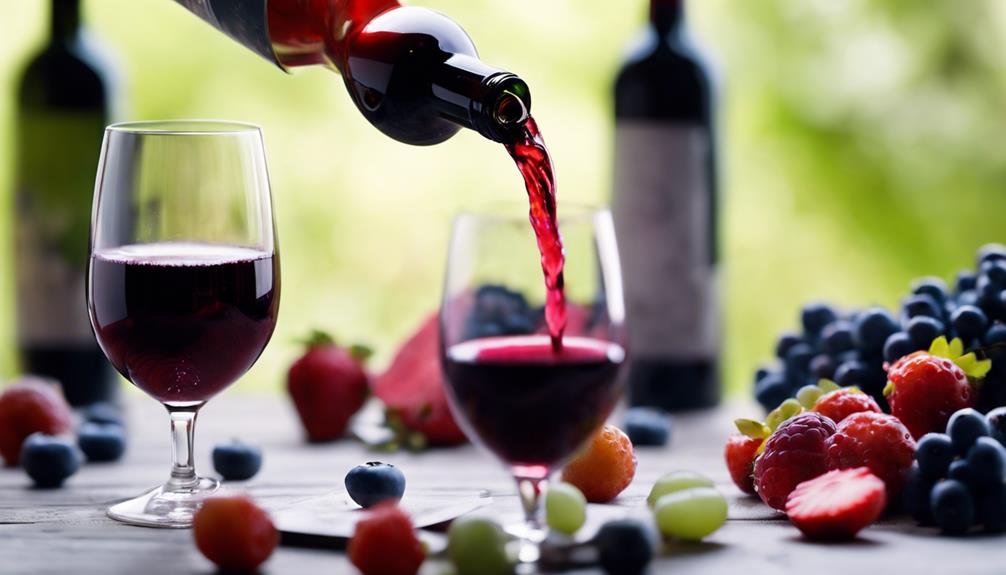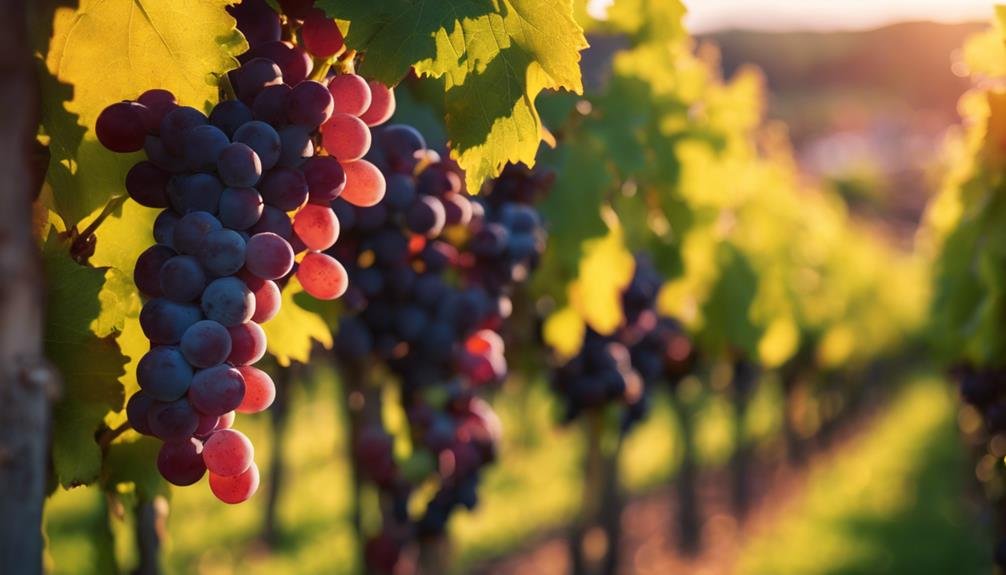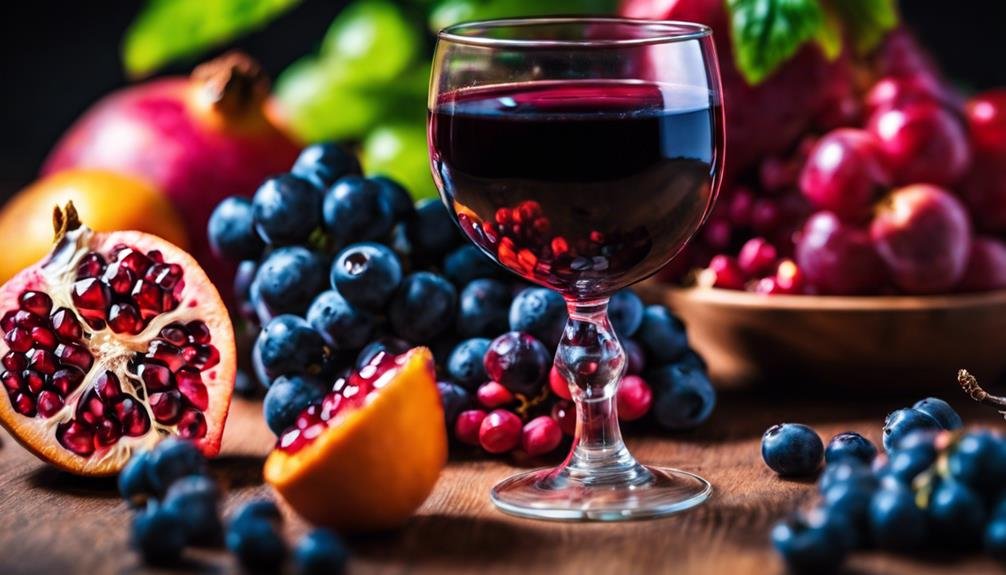Discover the powerful domain of wine antioxidants for cellular defense, immunity, and heart health. Compounds like resveratrol, quercetin, tannins, catechin, and proanthocyanidin in red wine work synergistically to benefit your well-being. Resveratrol enhances cholesterol and prevents blood clots, while quercetin boosts immunity. Tannins protect DNA, and proanthocyanidin boosts circulation. Moderation in wine intake is essential, with suggested limits of one drink for women and two for men daily. Wine enjoyment should be balanced with health considerations. Uncover further into the power of wine antioxidants for potential health perks.
Importance of Antioxidants in Health
Antioxidants play a pivotal role in maintaining peak health by safeguarding cells against oxidative stress and combating the effects of aging and disease. These powerful compounds provide essential antioxidant benefits by neutralizing harmful free radicals that can cause cellular damage.
By enhancing cellular protection, antioxidants help reduce the risk of chronic conditions such as cancer, heart disease, and cognitive decline. Consuming antioxidants from sources like red and white wine can assist in bolstering the body's natural defenses against oxidative stress.
Understanding the importance of antioxidants in health is key to promoting overall well-being and longevity. Incorporating antioxidant-rich foods and beverages into your diet can have a substantial impact on your cellular health and contribute to a healthier lifestyle.
Role of Wine Antioxidants
In exploring the benefits of incorporating antioxidant-rich foods and beverages into one's diet for cellular health and overall well-being, the role of wine antioxidants emerges as a significant component deserving closer examination. Wine antioxidants, such as resveratrol, quercetin, and proanthocyanidin, work together in what is known as antioxidant synergy to provide cellular protection against oxidative stress.
These antioxidants play an essential role in stabilizing reactive oxygen species (ROS) by donating electrons, thereby preventing damage to cells. By consuming wine in moderation, individuals can benefit from these antioxidants, which have been associated with various health advantages, including improved cholesterol levels, enhanced immunity, and protection against infections.
Understanding the importance of wine antioxidants can aid individuals in making informed choices to support their overall well-being.
Types of Antioxidants in Wine

Among the various components found in wine that contribute to its potential health benefits, a spectrum of powerful antioxidants can be identified. Red wine varieties, in particular, contain antioxidants such as resveratrol, quercetin, tannins, catechin, epicatechin, and proanthocyanidin.
Resveratrol, known for potential benefits like improving cholesterol levels and preventing blood clots, is one of the key antioxidants found in red wine. Quercetin boosts immunity and fights allergies, while tannins from grape seeds and skins aid in preventing infections and protecting DNA.
Proanthocyanidin, another antioxidant present in red wine, offers benefits like improving joint flexibility, blood circulation, and combating infections and allergies. Understanding the types of antioxidants in wine can help individuals make informed decisions about their consumption for potential antioxidant benefits.
Benefits of Resveratrol in Wine
Resveratrol, a prominent antioxidant found in wine, has been associated with potential health benefits including improvements in cholesterol levels and prevention of blood clots. Scientific research suggests that resveratrol, a polyphenol compound, may have positive effects on cardiovascular health by enhancing the function of blood vessels and reducing the risk of clot formation.
Studies have also indicated that resveratrol has antioxidant and anti-inflammatory properties that could contribute to overall well-being. While further research is still needed to fully understand the extent of its potential benefits, the existing evidence highlights resveratrol as a promising component of wine that warrants attention for its possible impact on health.
Moderation in Wine Consumption

Emphasizing the importance of responsible intake, maintaining moderation in wine consumption is a vital aspect to take into account for overall well-being and health. Setting drinking limits is essential, with the CDC recommending one drink per day for women and two for men.
Achieving alcohol balance is crucial to harnessing the potential benefits of wine antioxidants without tipping the scales towards risks associated with excessive alcohol consumption. While wine offers antioxidants, understanding the interaction between alcohol and antioxidants remains a subject requiring further research.
It is advisable that wine consumption should primarily be for enjoyment rather than solely for health benefits. Moderation is key to balancing the potential benefits and risks of wine consumption, ensuring a harmonious approach to incorporating wine into a healthy lifestyle.
Uncertainties Surrounding Wine Antioxidants
The understanding of uncertainties regarding the benefits of wine antioxidants requires further exploration through scientific research and analysis. The impact of alcohol content on the potential health benefits of wine antioxidants remains unclear. While some studies suggest positive health effects, it is not definitively proven whether wine is a beneficial addition to a healthy lifestyle.
Enjoyment and pleasure continue to be the primary reasons for consuming wine, with health benefits being a secondary consideration. The balance between scientific aspects and the enjoyment of wine is essential.
As a result, further research is needed to determine the exact relationship between wine antioxidants and health benefits, providing clarity on the role wine antioxidants play in promoting overall well-being.
Sources of Wine Antioxidants

Exploring the diverse origins of antioxidants found in wine sheds light on their potential health-promoting properties.
- Red wine contains antioxidants like resveratrol, quercetin, tannins, catechin, and proanthocyanidin.
- White wine offers antioxidants like glutathione and caffeic acid.
These antioxidant-rich beverages play a significant role in protecting against environmental toxins, preventing cancer, and reducing the risk of heart disease and kidney complications.
Understanding the sources of wine antioxidants is essential for making informed dietary choices. These antioxidants not only contribute to the taste and complexity of wine but also offer potential health benefits. Incorporating antioxidant-rich beverages like red and white wine into your diet can be a delicious way to support your overall health.
Frequently Asked Questions
Can Wine Antioxidants Reverse the Effects of Aging?
Antioxidants in wine, such as resveratrol and quercetin, may contribute to skin rejuvenation and cellular repair, potentially promoting longevity and possessing anti-aging properties. However, further research is needed to definitively establish these effects.
Are There Specific Wine Antioxidants for Brain Health?
Certain wine antioxidants, like resveratrol and quercetin, show promise for brain health by potentially enhancing cognitive function and protecting against age-related decline. However, further research is needed to fully understand their specific benefits in supporting brain function.
Do Different Wine Varieties Offer Unique Antioxidant Benefits?
Do different wine varieties offer unique antioxidant benefits? Red wine antioxidants like resveratrol and quercetin provide heart and immunity support, while white wine antioxidants, such as glutathione and caffeic acid, offer protection against toxins and diseases.
How Do Antioxidants in Wine Compare to Those in Fruits and Vegetables?
Antioxidants in wine, like resveratrol, quercetin, and tannins, offer benefits comparable to those in fruits and vegetables. While wine provides unique antioxidants, varying extraction techniques impact their concentration. Understanding antioxidant sources and benefits aids informed consumption choices.
Are There Risks Associated With Consuming Too Many Wine Antioxidants?
Consuming an excessive amount of wine antioxidants can lead to health risks associated with antioxidant overload. Moderation is essential to avoid potential adverse effects and maintain a balanced approach to reaping the benefits of wine antioxidants.
Conclusion
To sum up, it is important to take into account that red wine contains up to 10 times more resveratrol, a potent antioxidant, than white wine.
This underscores the potential benefits of moderate wine consumption in harnessing the protective properties of antioxidants.
As always, it is crucial to make informed choices and strike a balance to reap the potential health benefits of wine antioxidants.
